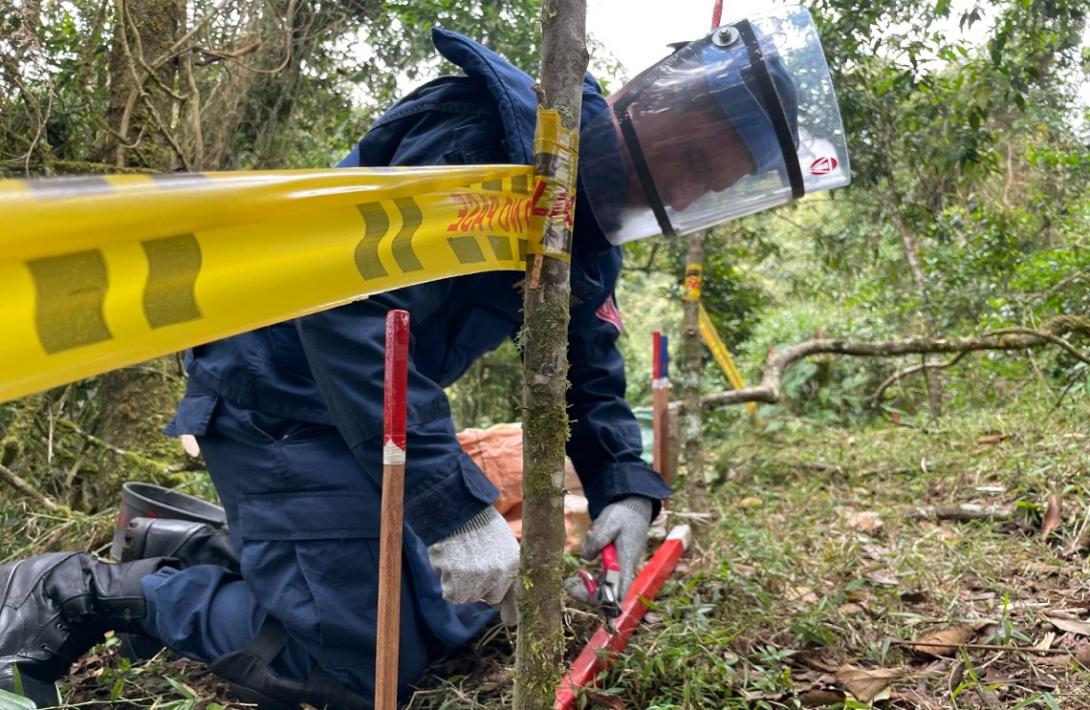Six departments have new municipalities decontaminated with the humanitarian demining of the National Army.
Among the ten territories free of suspicion of mines, there are: Montebello (Antioquia), Girón, Hato, Chima and Simacota (Santander), Güicán (Boyacá), Támara (Casanare), Rovira and Cajamarca (Tolima), Ipiales (Nariño).
So, with the work carried out by soldiers of the Brigade of Engineers of Humanitarian Demining, Colombia reaches 257 municipalities decontaminated by the National Army.
During the clearance work, the mine clearance specialists destroyed 25 explosive devices, intervened 395,389 square meters and liberated 559,871 square meters with Non-Technical Studies.
Although the official act of presentation was carried out in the municipality of Sonsón, the work of the National Army in that Antioquia region was carried out in the municipality of Montebello, benefiting 83% of the inhabitants who live in rural areas, who will now be able to move with tranquility and market their agricultural products in the urban area and part of the department.
Particularly in that territory, members of the Military Forces intervened five dangerous areas, ruling out the presence of anti-personnel mines in more than 56,000 square meters.
Virgilio Garzón, mayor of Montebello, who was once a victim of the armed conflict in 2000 and had to leave the area for fear of losing his life and family, says: “I feel happy, very calm to know that the children of our countryside can run freely, that they can go to take a meal in their parents’ house, that moms can sit quietly to chat, that they can walk calmly through our municipality. One of the projects that the municipal administration has, the last time the Demining Army had is the Alto de la Virgen hill where we will go hiking there, an ecological trail for the enjoyment of nature. Montebello has all the potential for tourism to arrive, it has the oldest chapel in Antioquia, where Antioquia began to pray.”
In total there are 23 villages, one municipality and seven places that are now free of suspected anti-personnel mines.
Lieutenant Colonel Alexander Agudelo, commander of the Humanitarian Demining Engineer Battalion No.7, stated that: “In the presentation of Montebello it was possible to conduct the works of clearance in more than 56,000 square meters, we work on manual demining and non-technical Studies, it is a job that is very rewarding, because in addition to distributing the territories free of suspicion of anti-personnel mines, this operation led to the return of the inhabitants, there are already people who are doing productive projects and returning to their farms, producing in the areas of each of the activities that can carried out according to the specialty of each sector and this has led people to feel very happy with the work done.”
Those words of Lieutenant Colonel are confirmed with the testimony of Mr. Rodrigo Antonio Escobar Román, who benefits of the demining in part of his farm: “they were there in the farm because there were three mines, two were deactivated and the other exploded. We realized the problem of the mine because I was out during eight years, displaced, I was not able to return to the farm, when I went, they told me I could already enter, but there was always fear, due to the history that I had had, I found the a bomb, I don't know what subversive group was the one who planted it, it exploded because a lightning triggered it, as there are so many electric shocks in the zone. In that land people can plant avocado, lemon Tahiti, and citrus fruits such as lemon, orange, tangerine, and so, now everything is farmable.”
With Montebello, the department of Antioquia, completes 29 territories free of the suspicion of anti-personnel mines.
Source: Press - National Army





